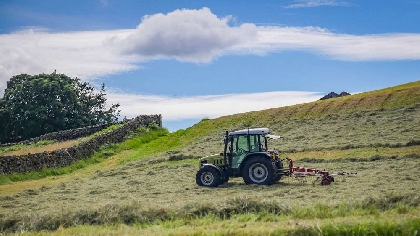
Farmers may feel more comfortable seeking medical advice from a vet than a GP, a report into how to improve North Yorkshire agricultural workers’ health found.
The study, Ploughing through barriers: Understanding the challenges and promoting help-seeking in farming communities, found that many farmers struggle to take time off due to the constant demands of looking after livestock and crops — and prioritise their work over their health and well-being.
The report was prepared by independent Watchdog Healthwatch North Yorkshire.
It was compiled through online and in-person surveys and conversations with more than 200 farmers, GPs and health workers at auction marts and agricultural shows.
As well as a lack of awareness about available services and a belief that their problems were not serious enough to justify taking up health professionals’ time, some farmers felt that GPs and other healthcare professionals did not fully appreciate the demands of farming life and may offer advice that was impractical or unrealistic, the report noted.
Some farmers said they were worried about confidentiality in small rural communities if they sought help, particularly for mental health issues.
Others said they worried that disclosing mental health issues to a doctor could lead to their gun license being revoked, which were essential for their work and social life.
The report noted that farmers often had strong relationships with their vets and may feel more comfortable discussing health concerns with them rather than with a doctor.
The report stated: “There are many barriers preventing the farming community in North Yorkshire from seeking help for health and well-being issues, including time constraints, logistical challenges, lack of awareness, geographical isolation and stigma.
“All these factors contribute to delays in seeking help, which is resulting in poorer health outcomes for the farming community of North Yorkshire.
“Despite these barriers, several solutions were identified that could encourage earlier engagement with health and well-being services.”
The report made a number of recommendations to improve health services for farmers in North Yorkshire.
It recommended expanding the provision of health promotion and prevention services at venues such as auction marts and rural pubs.
A pilot scheme to run a mobile health unit in rural areas of the county, using a similar scheme run in Lincolnshire as an example, was suggested.
Launching pilot walk-in clinics in GP practices that serve farming populations to provide accessible healthcare was also recommended, along with ensuring that NHS and GP appointments considered the working hours of farmers and seasonal commitments to support attendance.
Other ideas included encourage rural professionals working with the farming community, such as vets, to undertake training to help them identify potential health issues and signpost farmers to the right resources.
The report said that it was best to avoid clinical language with farmers and instead use “terminology and humour that resonates with the farming community”.
The study will be discussed by members of North Yorkshire Council’s health scrutiny committee next week.








Comments
Add a comment